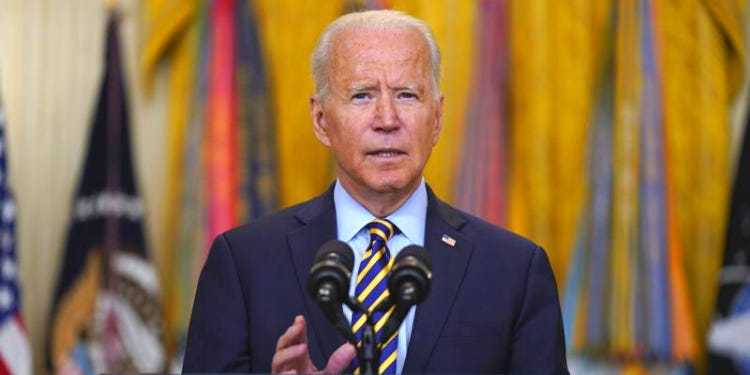Last week, while defending his decision to remove all American troops from Afghanistan, President Biden said of the Taliban threat, “I trust the capacity of the Afghan military, who is better trained, better equipped, and … more competent in terms of conducting war.”
My mouth dropped open at those words, and it wasn’t just because I hadn’t previously heard anyone — including top military leaders and members of the Biden administration — attempt to make such a case. What also got me was that the statement flew directly in the face of what was currently going on in Afghanistan… including in real-time reporting from the region.
Civil war was already underway, led by a Taliban offensive in the northern part of the country (a traditional area of government strength). Not waiting for the completion of our withdrawal, the Taliban (in concert with al-Qaeda) had been making huge territorial gains across the nation through various combat operations. According to the Long War Journal, they’d already taken over 20 percent of country, half of that (38 of Afghanistan’s 407 districts) in a mere six days. Without U.S. support for the first time in many years (not even airstrikes), lots of Afghan troops had already laid down their arms, abandoned their posts, and sought refuge in surrounding countries.
Biden’s ‘Baghdad Bob’ moment wasn’t all that different than the president’s claims a few months ago that the border situation between Mexico and the U.S. was under control.
Things have since worsened in Afghanistan. Just about every day there are new reports of Taliban gains. The group now holds at least 139 districts, nearly tripling its territorial rule in the span of just two months. Several provincial capitals are now in their cross-hairs.
This incursion was not only predictable, but actually predicted... by just about every military and intelligence expert on the region (everything but the speed at which it has occurred).
The Taliban’s ultimate goal is to restore the Islamic Emirate of Afghanistan, the Islamic State that was overthrown by the Northern Alliance almost 20 years ago, shortly after 9/11. But for that to occur, the U.S. needs to be gone — something that Biden now says will happen by the end of August.
American withdrawal is shaping up to be a huge mistake by both President Biden and President Trump — one that would have failed any reasonable cost-benefit analysis in regard to U.S. interests and national security. The faulty “endless war” narrative (which is remarkably never applied to a number of countries where we've had U.S. soldiers stationed for much longer), and leaders looking to carve out a significant foreign policy spot for themselves in the history books, have trumped the reality, resources, and hard-earned stability on the ground.
Prior to our withdrawal efforts, U.S. combat operations and casualties in Afghanistan had been very rare. No U.S. solider has been killed on an operation in well over a year. Our role there had been a supporting, stabilizing one. We’d been helping to train and provide resources for the Afghan National army, as well as lend support to NATO troops. We had a light and relatively inexpensive military footprint, the presence of which served as an effective deterrent against the Taliban (and their human rights atrocities), an important hub for anti-terror intelligence gathering, and a strategic regional advantage against neighboring threats.
Yet, Biden said in that same press conference last week, “I will not send another generation of Americans to war in Afghanistan with no reasonable expectation to achieve a different outcome. The United States cannot afford to remain tethered to policies created in response to a world as it was 20 years ago.”
The statement undoubtedly sounded good to many Americans... but it was also nonsensical.
What we’d seen in Afghanistan in recent years (not 20 years ago) resembled more of a “cold war” situation than anything else. American withdrawal, however, is already producing something much closer to the type of war that Biden described. The worsening conditions are far more likely to, at some point, bring back U.S. military operations inside the country. Biden clearly didn't learn this lesson during the last administration he was in, when the U.S. had to send troops back to Iraq to deal with the horrific ISIS insurgency brought on by our premature withdrawal from the country.
I understand the frustration many Americans have had with the Afghan government’s inability to — on their own — prevent a radical extremist takeover of their country. It’s a sad reality (despite Biden pretending otherwise), and I’ve shared that frustration for a long time.
But an open-ended hand-holding operation, that had become a small but lucrative investment for the United States and our allies, was absolutely worth keeping. I'm afraid that will become more and more apparent in the coming weeks and months.
--



